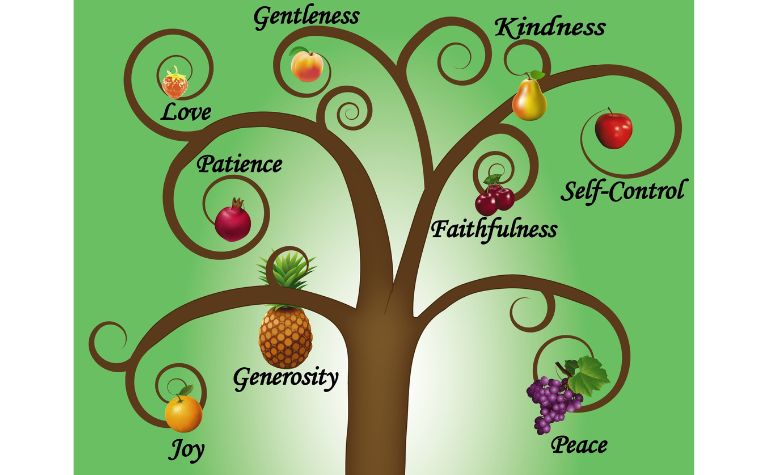The Bible teaches that the Holy Spirit indwells every Christian. One result of his presence in a believer’s life is that their character, attitude, and behavior become more like Jesus (or “Christlike”). The Apostle Paul used the metaphor of bearing fruit to describe the Spirit’s work in the lives of believers. Because of this, one question Christians often ask is how they can encourage fruit to grow in their lives.
Christians develop the fruit of the Holy Spirit by getting rid of sin and cultivating love, joy, peace, patience, kindness, goodness, faithfulness, gentleness, and self-control. Believers must prune what is not of the Spirit and pursue the transformation of their character, attitude, and behavior.
How does destroying sin result in the fruit of the Holy Spirit? Why is sanctification important in the lives of Christians? What does it mean to cultivate righteousness? How does that bear fruit? How does sanctification relate to justification? Keep reading to learn the answers to these questions and others.
Also see What Is the Purpose of the Fruit of the Holy Spirit? to learn more.

How does destroying sin result in bearing fruit?
Sin stunts growth and maturity in the lives of Christians because its contrary to God’s moral standards. A person can’t demonstrate character, attitudes, and behaviors that are contrary to the example and teaching of Jesus and expect to grow in likeness to him.
Therefore, rejecting the ungodly influences in the world, the temptations of the flesh (i.e., sinful nature), and resisting the devil will help a Christian bear fruit.
Paul writes that sin and the Holy Spirit are at war against each other. “For the desires of the flesh are against the Spirit, and the desires of the Spirit are against the flesh, for these are opposed to each other, to keep you from doing the things you want to do” (Gal. 5:17, ESV).
- The NIV says, “they are in conflict with each other”
- The NLT says, “These two forces are constantly fighting each other”
- The KJV and NKJV say these two are “contrary” to each other
A Christian can’t be on both sides in the battle between sin and the Spirit, but that’s what happens when they aren’t actively working to eradicate rebellion and transgression against God from their lives.
What sins does Paul list?
As most Galatians scholars point out, Paul didn’t intend his list of sins to be exhaustive, describing every transgression a person may commit. Readers can detect this implication from the phrase that ends the list, “and things like these.”
Nevertheless, the list is instructive, and probably everyone has committed one or multiple sins on the list because it includes not only behaviors (e.g., sexual immorality) but attitudes (e.g., envy).
In Galatians 5:19-21, Paul writes, “Now the works of the flesh are evident,” then he lists:
- sexual immorality
- impurity
- sensuality
- idolatry
- sorcery
- enmity
- strife
- jealousy
- fits of anger
- rivalries
- dissensions
- divisions
- envy
- drunkenness
- orgies
- and things like these
Is the Holy Spirit necessary to get rid of sin?
Even though growth in the Christian life is cooperative, and people play an essential role (more below), eradicating sin never occurs without the Holy Spirit. Romans 8:13 reads, “For if you live according to the flesh you will die, but if by the Spirit you put to death the deeds of the body, you will live” (ESV). The KJV translation reads, “through the Spirit do mortify the deeds of the body.”
The Puritan author, John Owen, once said, “Mortification from a self-strength, carried on by ways of self-invention, unto the end of a self-righteousness is the soul and substance of all false religion… The Spirit alone is sufficient for this work. All ways and means without Him are useless. He is the great efficient. He is the One who gives life and strength to our efforts” (emphasis added).
Also see What Did Jesus Say About the Holy Spirit? to learn more.

How does cultivating righteousness result in bearing fruit?
To begin the passage in which Paul instructs Christians to get rid of sin and cultivate the fruit of the Spirit, he writes, “But I say, walk by the Spirit, and you will not gratify the desires of the flesh” (ESV). Therefore, actively, purposefully, and diligently living in moral alignment with the indwelling Spirit will, as a result, eradicate sin in a person’s life. The metaphor of walking by the Spirit means to live in a Christlike way.
Like Paul gave readers a list of sins, he also provides examples of behaviors, attitudes, and actions that align with the Holy Spirit. Also, like the sin list, he doesn’t intend these examples to be exhaustive. Instead, they are excellent evidence of a person who the Spirit indwells. In Galatians 5:22-23, Paul writes,
- But the fruit of the Spirit is love
- joy
- peace
- patience
- kindness
- goodness
- faithfulness
- gentleness
- self-control
To conclude the list, he writes that if a person is a Christian, they will eradicate sin and cultivate fruit in their lives. “And those who belong to Christ Jesus have crucified the flesh with its passions and desires” (Gal. 5:24, ESV).
Also see What is Spiritual Warfare? to learn more.

Why is sanctification important in the lives of Christians?
The Bible teaches that a person’s salvation is exclusively a work of God. Ephesians 2:8 reads, “For by grace you have been saved through faith. And this is not your own doing; it is the gift of God” (ESV). Romans 3:24 adds that believers are “justified by his grace as a gift, through the redemption that is in Christ Jesus.” Therefore, salvation is God’s free gift to sinners who believe in Jesus (cf. John 3:16).
Justification, which is the declaration that through Jesus, sinners are made righteous, is a work of God alone. However, sanctification, which refers to the spiritual transformation that believers experience into Christlikeness after being saved, is cooperative. In summary, God alone saves; people don’t contribute anything to their salvation. However, Christians do contribute to their growth and maturity.
What is the evidence of justification?
Bible scholar, F.F. Bruce, writes, “Those who have been justified are now being sanctified; those who have no experience of present sanctification have no reason to suppose they have been justified.” [1] In other words, Christians should expect to see the fruit of the Holy Spirit in their lives. Just like healthy fruit trees bear healthy, edible food, believers should produce evidence of transformation into Christlikeness.
The New Testament has different ways of describing sanctification, including terms like “make every effort,” “strive,” and “work out.” In some instances, the description refers to a specific behavior (e.g., Eph. 4:3). Yet it can also generally refer to how a Christian lives (e.g., 2 Pet. 1:5). The verses listed below as examples of where writers use these terms are from the NIV translation.
- Ephesians 4:3 says, “Make every effort to keep the unity of the Spirit through the bond of peace.”
- Hebrews 4:11, “Let us, therefore, make every effort to enter that rest, so that no one will perish by following their example of disobedience.”
- 2 Peter 1:5, “For this very reason, make every effort to add to your faith goodness; and to goodness, knowledge.”
- 1 Timothy 4:10, “That is why we labor and strive, because we have put our hope in the living God, who is the Savior of all people, and especially of those who believe.”
- Philippians 2:12, “Therefore, my dear friends, as you have always obeyed—not only in my presence, but now much more in my absence—continue to work out your salvation with fear and trembling.”
Also see What Does the Holy Spirit Do? to learn more.
References:
[1] Romans by F.F. Bruce. TNTC. p. 135.
[2] Source
Related Questions
The Bible is full of descriptions of the Holy Spirit's nature and works, from Genesis to Revelation, making it clear that the third person of the Trinity is active in the lives of Christians....
One of the most common questions people have about the Holy Spirit is what it means to blaspheme him. People are curious about this because they know it's an unforgivable sin, and some fear they have...
